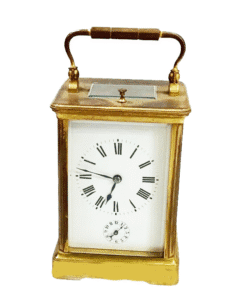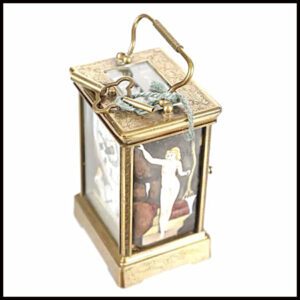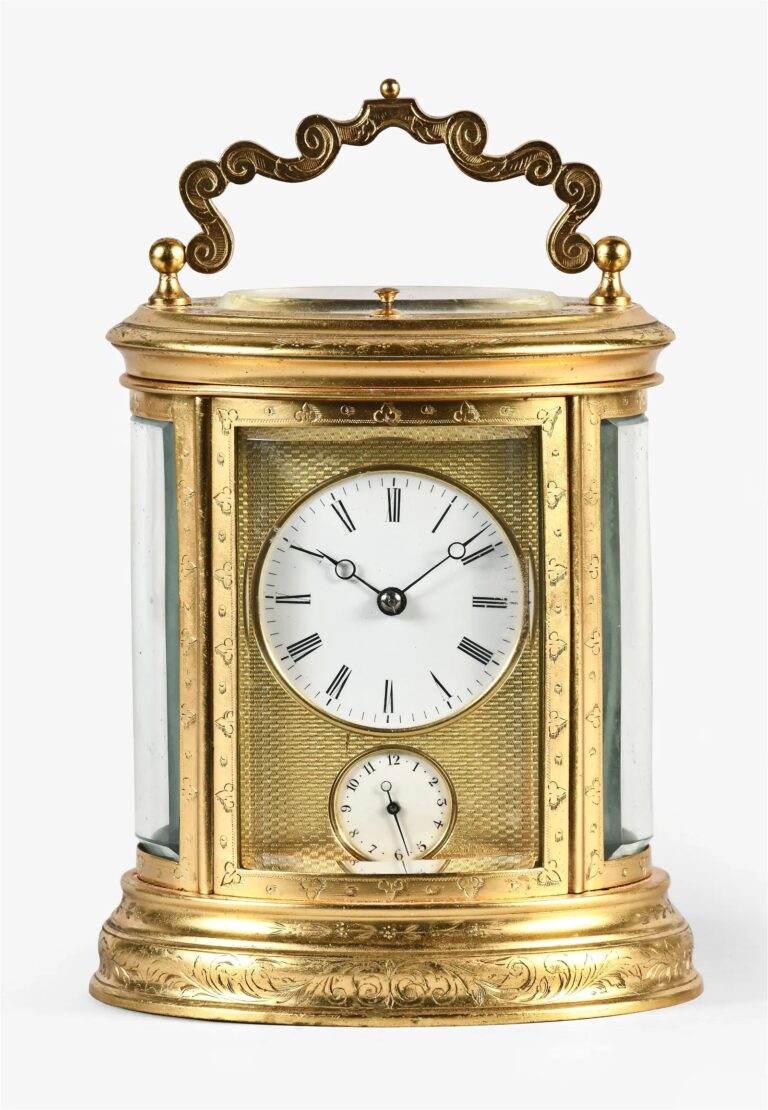An antique carriage clock is more than just a timepiece—it’s a piece of history, a work of art, and a testament to the craftsmanship of centuries past. Whether you’re a seasoned clock collector or just discovering the world of antique timekeeping, the carriage clock holds a unique place in horological history. In this post, we’ll explore what makes the antique carriage clock so special, how to identify authentic pieces, and why these clocks remain so desirable today.
What Is an Antique Carriage Clock?

Originating in France during the early 19th century, the antique carriage clock was designed for travelers. These clocks were compact, portable, and encased in brass or gilt metal with a carrying handle—hence the name “carriage” clock. They were often spring-driven and featured an escapement visible through a glass top window.
Unlike wall clocks or mantel clocks of the same period, carriage clocks were made to be sturdy and precise, suitable for long journeys by train or carriage. Their design evolved over time, but the elegance and utility remained constant.
Why Collect Antique Carriage Clocks?
Collectors value antique carriage clocks for their intricate design, historical significance, and mechanical excellence. Many feature hand-painted enamel dials, beveled glass panels, and intricate movement mechanisms. Some models also include complications such as alarms, repeaters, or even moon phases.
Whether you collect them for their beauty or their engineering, owning a carriage clock is like owning a small slice of 19th-century innovation.
How to Identify an Authentic Antique Carriage Clock
If you’re considering purchasing an antique carriage clock, it’s essential to ensure authenticity. Here are a few tips:
- Check the case and materials: Genuine antique carriage clocks often have brass or gilt-bronze cases. Look for signs of age and patina, but also quality construction.
- Inspect the movement: The inner workings of the clock should show evidence of handcrafting. Many antique pieces will be stamped with the maker’s mark or country of origin.
- Look for a beveled glass: Authentic clocks typically have beveled glass on all sides, allowing you to view the movement.
- Ask for provenance: Reputable dealers will often provide a history of ownership or at least some details about the clock’s origin.
Buying from a trusted antique dealer or auction house is the best way to ensure you’re getting a genuine piece.
Caring for Your Antique Carriage Clock

Maintenance is crucial for preserving the beauty and function of your antique carriage clock. Here are some best practices:
- Keep it clean but avoid harsh chemicals. Use a soft, dry cloth to dust the exterior.
- Wind it carefully. Over-winding cannot damage the mechanism, but trying to force anything an a delicate instrument, is never wise. Consult a horologist rather than experiment.
- Store it in a stable environment. Avoid exposing it to extreme temperatures or humidity.
- Have it serviced regularly. A professional clockmaker can clean and oil the internal mechanism to keep it running smoothly.
Decorating with Antique Carriage Clocks
Beyond their practical use, antique carriage clocks make stunning decorative pieces. Their timeless appeal complements a variety of interior styles—from traditional to eclectic. Place one on a bookshelf, writing desk, or mantel to add a touch of sophistication and historical depth.
Some collectors also enjoy displaying their clocks in glass cases to showcase the detailed craftsmanship while protecting them from dust and damage.
Final Thoughts: The Enduring Appeal of the Carriage Clock
The antique carriage clock remains a beloved collectible for good reason. With its blend of functionality, artistry, and historical relevance, it offers a window into the past that few other objects can provide. Whether you’re starting your collection or adding a rare piece, a well-chosen carriage clock can bring timeless charm to your space—and continue ticking for generations to come.
Frequently Asked Questions (FAQ)
What is the value of an antique carriage clock?
The value varies depending on the maker, age, condition, and features. Some basic models may sell for a few hundred dollars, while rare or elaborately decorated clocks can fetch thousands.
Are these small clocks a good investment?
While they can appreciate in value, most collectors buy them for their craftsmanship and charm. If properly maintained, they can hold and even increase in value over time.
Where can I buy an authentic carriage clock?
Reputable antique shops, online auctions, and estate sales are common sources. Always verify authenticity and request documentation if available.


